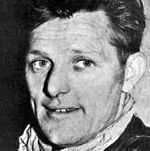
Thomas Price was a British motorcycle speedway rider. In 1949 he won the first Speedway World Championship to be held after the Second World War.

Colin George Pratt was a British motorcycle speedway rider and later promoter of the Coventry Bees who compete in the British Elite League.
Thomas Robert Croombs was a Speedway rider who finished third in the Star Riders' Championship in 1931, the forerunner to the Speedway World Championship.
Alec George Statham was a Speedway rider who won the London Riders' Championship in 1949 whilst with the Wimbledon Dons, and also represented England many times.

Ron Johnson was a speedway rider who won the London Riders' Championship in 1945 (unattached) and in 1946 whilst with the New Cross Rangers.

Jack Ellis Young was a Motorcycle speedway rider who won the Speedway World Championship in 1951 and 1952. He also won the London Riders' Championship 1953 and 1954 and was a nine time South Australian Champion between 1948 and 1964.
John Robert Vickers (Ken) McKinlay was an international speedway rider, captaining Scotland, England, Great Britain and Europe teams. He also finished on the rostrum of the British Speedway Championship finals twice, second in 1964 and third in 1965. His nickname Hurri-Ken was given to him by famous speedway promoter Johnnie Hoskins.
John (Jack) Parker was an international motorcycle speedway rider who made his debut at the Whitsun meeting at High Beech in 1928. He won the British Riders' Championship in 1949 and finished second in the 1949 World Championship.
Thomas Stanley Dell was a speedway rider.
Kenneth Lloyd Goffe was a British motorcycle speedway rider.
Squire Francis Waterman, better known as Split Waterman, was an English speedway rider who twice finished second in the Speedway World Championship final. Waterman took up speedway while serving in the British Army in Italy and went on to become one of the top riders of the post-war era. He made the headlines again in the late 1960s when he was convicted of gold smuggling and firearms offences.

Arthur Atkinson was a former international motorcycle speedway rider and promoter who appeared in the first Speedway World Championship final in 1936.
Frank Lawrence was a motorcycle speedway rider from England, who rode for New Cross in the post-World War II period.
Tommy Allott was a motorcycle speedway rider who rode from the sport's earliest days in Britain until the 1950s.
Malcolm Stewart Craven was a motorcycle speedway rider from England, who rode before and after World War II.
Colin Watson was a successful British motorcycle speedway rider from the sport's early years in the late 1920s and 1930s.
George James Wilks was a British motorcycle speedway rider who rode for Harringay and Wembley, and also rode in test matches for England.
Michael William Lanham is a former motorcycle speedway rider from England, who had a long career with Ipswich Witches.
Carl Glover is a former motorcycle speedway rider from England.
Walter Richard Lloyd known as Wally Lloyd was a motorcycle speedway rider who rode in the earliest days of the sport in Britain.





